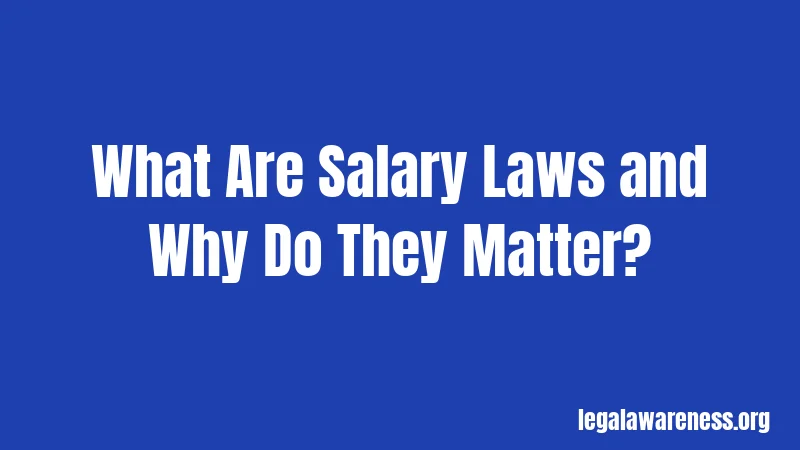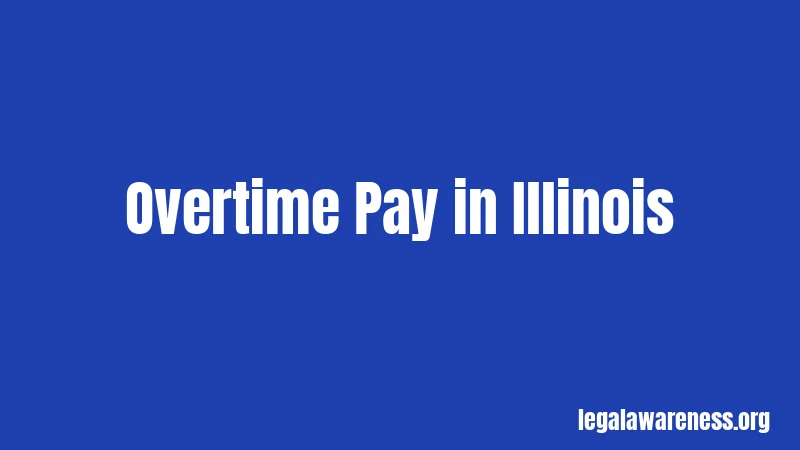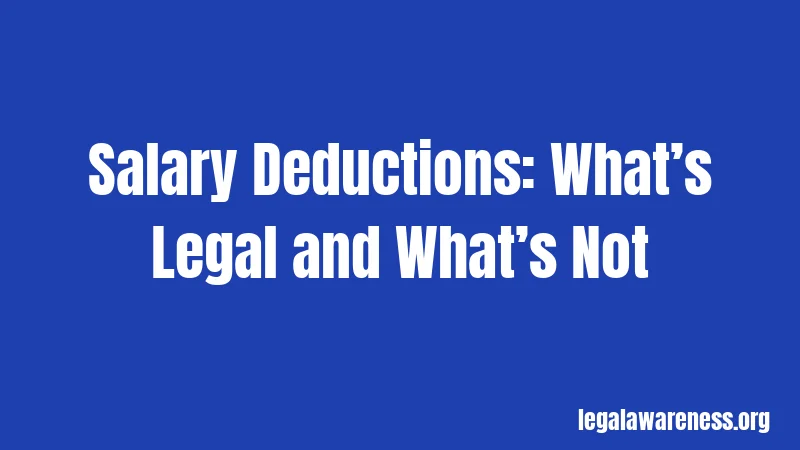Illinois Salary Laws in 2026: Your Complete Wage Rights Guide
Most people don’t realize how much protection Illinois law gives them when it comes to wages. Seriously. The state has strict rules about how much employers must pay, when they have to pay it, and what deductions they can make. If you work in Illinois or run a business there, you need to know these rules.
Here’s why this matters: employers who break wage laws face serious penalties. But more importantly, you have rights. This guide will walk you through exactly what you need to know about Illinois salary laws.
What Are Salary Laws and Why Do They Matter?

Okay, let me break this down simply. Salary laws are rules that protect workers. They make sure you get paid fairly and on time. They set minimum wages. They decide which workers get overtime pay. They even control what money your employer can take from your paycheck.
Think of these laws like traffic rules for employers. Without them, there’d be chaos. Workers could get paid whenever bosses felt like it. Minimum wage could be a dollar an hour. Employers could take half your pay for “uniforms.” Illinois says no. Not here.
Illinois Minimum Wage
Here’s the big one. Illinois has a minimum wage. As of 2024, it’s $14 per hour. This applies to almost every worker in the state. You might be wondering if your boss can pay you less. The answer is pretty much always no.
Wait, it gets better. Illinois minimum wage increases annually. The state has a plan to eventually reach $15 per hour. So if you’re being paid below the current minimum, that’s illegal. Your employer owes you back pay.
There are a few tiny exceptions. Workers under 18 can sometimes be paid 85% of minimum wage for their first 90 days. Some tipped employees follow different rules. But for most people? Minimum wage applies, period.
Sound complicated? It’s actually not. The basic rule is simple: your boss must pay you at least $14 per hour for every hour you work.
Overtime Pay in Illinois

Now here’s where many people get confused. Not everyone gets overtime pay. But if you do, the rules are strict.
In Illinois, non-exempt employees must get overtime pay. What’s an exempt employee? Basically, someone in management, professional, or administrative positions might not qualify. But most workers are non-exempt. That means you qualify for overtime.
Here’s what happens with overtime. When you work more than 40 hours in a week, your employer must pay you at least 1.5 times your normal hourly rate for those extra hours. So if you make $14 an hour, overtime would be at least $21 per hour.
Let me be clear about this: your boss can’t just decide you’re “salaried” to avoid overtime. The law looks at your actual job duties. A cashier making $30,000 a year is still probably entitled to overtime. Salary doesn’t automatically mean no overtime pay.
Your employer also can’t make you skip overtime. They can’t say “you’re salaried, so no extra pay no matter how much you work.” That’s illegal in Illinois.
When You Must Be Paid
You’re not alone if you’ve wondered when payment is actually due. Most people don’t realize how specific these rules are.
In Illinois, you must be paid during your regular pay period. The state requires payment at least twice a month. But here’s the important part: your employer can’t hold back your final paycheck. When you leave a job, you get paid for all hours worked by your next regular payday.
This matters more than you might think. Some employers try to hold final paychecks hostage. They might claim you owe them for damages or uniforms. Illinois says that’s not okay. Your final paycheck must include all wages earned, minus only legal deductions.
What counts as a legal deduction? Taxes, of course. Social Security. Health insurance premiums. Court-ordered child support. Meals or lodging if your job requires it. But not damages, not uniforms, not “training costs.”
Employers who don’t pay on time face serious consequences. They can be sued. They might owe penalties. You could get triple the unpaid wages in some situations.
Salary Deductions: What’s Legal and What’s Not

Okay, pause. Read this carefully. This is where employers often break the law without realizing it.
Your employer can’t just take money from your paycheck whenever they want. There are strict rules about what deductions are legal. Let me walk through this.
Taxes are obviously legal. So are retirement contributions if you agreed to them. Uniform costs are sometimes okay, but they can’t reduce you below minimum wage. Meal costs are sometimes legal, but again, not if they drop you below minimum wage.
Here’s where it gets tricky. Can your boss deduct money for “breakage” or “damaged merchandise”? Nope. Not in Illinois. The only time an employer can deduct for damage is if it’s theft or gross negligence, and even then, there are limitations.
What about uniforms? Some employers provide them free. Others charge you. Illinois says if your employer makes you wear a uniform, they can charge for it. But here’s the catch: the deduction can’t bring you below minimum wage after taxes.
Wondering about other deductions? Cell phone charges? Parking fees? Tools? These have strict rules. Generally, employers can’t deduct for tools needed for your job. Equipment that’s standard for the industry? Usually free. But specialized tools? Sometimes they’re your responsibility.
The safest rule: any deduction must be legal, must be authorized by you in writing, and must not reduce your pay below minimum wage. If you’re unsure about a deduction on your paycheck, ask your employer for the reason in writing.
Overtime Exemptions: Who Actually Doesn’t Get Overtime?
Not everyone in Illinois gets overtime. Some positions are exempt. But here’s the honest truth: far fewer people are exempt than employers sometimes claim.
Executive employees are exempt. This means managers with real supervisory power. Not just someone with the title “manager.” They have to actually manage people. They need real authority over hiring, firing, and discipline.
Administrative employees are exempt. Think office managers, HR specialists, certain accountants. These are people doing non-manual work that directly supports business operations.
Professional employees are exempt. Lawyers, doctors, engineers, teachers, nurses. People who need specialized education and training.
Sales employees might be exempt if they work outside the office. Real estate agents, for example. But retail workers? No. They’re not exempt just because they “sell” things.
Here’s the important part: being salaried doesn’t automatically make you exempt. Your job duties matter. A salesperson making $35,000 a year working retail might still get overtime. A manager making $40,000 might not qualify if they don’t actually supervise anyone.
This confuses a lot of people. Honestly, it’s one of the biggest gray areas in Illinois wage law.
Minimum Wage Increases and Recent Changes
Illinois has been steadily raising minimum wage. As of January 2024, it’s $14 per hour. But here’s what’s coming.
The state passed a law back in 2019 that schedules regular increases. Each year, the minimum wage goes up. The goal is to eventually reach $15 per hour. But the timeline got a bit complicated.
Recent changes slowed down the increases slightly. Instead of hitting $15 right away, the state extended the timeline. But make no mistake: Illinois minimum wage keeps going up. This is one of the highest in the nation.
What does this mean for you? If you’re on a fixed salary, your employer might not automatically raise your pay. But if you’re hourly, you should see increases. If you’re making the old minimum wage and haven’t gotten a raise, that’s a problem.
Salary Disclosure and Transparency Laws
Wait, it gets better. Illinois has new transparency rules about salaries.
Starting in 2024, job postings must include salary ranges. Your employer can’t hide what the job pays. If there’s a salary range from $35,000 to $50,000, they have to tell you up front. No more finding out after three interviews.
This applies to positions posted in Illinois. Employers can’t ask you what you made at your last job to avoid paying fairly. They also can’t punish you for discussing your salary with coworkers.
This might be the most important recent change. Transparency leads to fairness. When everyone knows the salary range, it’s harder for employers to underpay people based on gender or race.
Meal Breaks and Rest Periods
Here’s one that surprises people. Illinois doesn’t actually require employers to give meal breaks. Not by state law, anyway.
But wait, before you panic. Many employers give breaks because federal law or contracts require it. Or because it’s just good practice. Many industries have their own rules too.
The important thing: if your employer gives you breaks, they must pay you for some of them. Breaks under 20 minutes? You get paid. Longer meal breaks? You don’t have to be paid. That’s the basic rule.
Many employers give 30-minute or one-hour unpaid lunch breaks. That’s usually legal if the break is long enough. Short paid breaks count as work time.
When Employers Break the Law: Penalties
So what happens if your employer breaks these rules? Let’s talk penalties.
If you’re not getting paid minimum wage, your employer owes you back pay. But it doesn’t stop there. You can sue for penalties. In some cases, you get triple damages. That means if your employer owes you $1,000 in unpaid wages, you might recover $3,000.
If your employer didn’t pay you overtime, same thing. Back pay, plus penalties. Plus possibly attorney fees and court costs.
Misclassifying you as exempt when you’re not? That’s a common violation. You could be owed years of overtime pay.
Illegal deductions from your paycheck? Your employer might owe you those amounts plus penalties.
Here’s where it gets serious. Illinois has penalties that stack up. You don’t just get your money back. The penalties are designed to make employers think twice before breaking wage laws. And honestly, that’s the point.
Independent Contractors and Gig Workers
Wondering if these rules apply to you? This one’s important if you do gig work or freelance jobs.
Independent contractors have fewer protections. They don’t get minimum wage requirements. They don’t get overtime. Illinois treats them differently than employees.
But here’s the catch: not everyone claiming to hire you as a “contractor” actually can. Illinois uses a test to determine if you’re really an independent contractor. The employer must show that you’re free to work for others, that you control how you work, and that you’re not integral to the business.
A gig economy worker for a delivery app? They might be an employee, not a contractor. A freelance writer taking projects from multiple companies? Probably a contractor. Someone working exclusively for one company, doing exactly what they’re told, on their schedule? Might be an employee.
Misclassifying you as a contractor when you’re really an employee is illegal. This is a growing area of wage law. More and more workers are fighting back.
How to Protect Yourself
Okay, here’s what you actually need to do. Stay with me here.
First, keep records. Save every paycheck. Track your hours worked. Note when you work overtime. This creates proof if there’s ever a dispute.
Second, understand your pay. Read your paycheck stubs carefully. Make sure deductions match what you authorized. If something’s wrong, ask immediately.
Third, talk to coworkers. Illinois law specifically protects your right to discuss wages. You can’t get fired for talking about salary. This transparency helps you spot unfair pay.
Fourth, report violations. You can contact the Illinois Department of Labor. You can file a complaint with the U.S. Department of Labor. You can consult with an employment lawyer. Don’t just accept illegal practices.
Fifth, don’t accept reprisal. If you report wage violations, your employer can’t fire you or punish you. That’s illegal retaliation. If it happens, you have a legal claim.
Frequently Asked Questions
Can my boss make me work without pay? No. You must be paid at least minimum wage for every hour you work. If your boss asks you to work unpaid, that’s illegal. This includes unpaid “training time” or unpaid setup time.
What if I’m working under the table? You still have rights. Being paid cash doesn’t change wage laws. Your employer still owes you minimum wage, overtime, and legal deductions. You can still file a complaint.
Can I waive my right to overtime pay? Not in Illinois. You can’t agree to less than time-and-a-half for overtime hours. Any agreement to waive overtime is void. Your employer still owes you the full amount.
What’s the difference between salary and hourly pay? The payment method doesn’t determine your rights. Some salaried workers get overtime. Some hourly workers don’t. It depends on your job duties, not your pay type.
How long do I have to sue for unpaid wages? You generally have three years to file a lawsuit for wage violations. Some violations have different timeframes. But don’t wait too long. Consult a lawyer to understand your specific situation.
Final Thoughts
Now you know the basics of Illinois salary laws. Your employer must pay you fairly. They must pay you on time. They can’t take illegal deductions. They must pay overtime when required. You have the right to discuss wages with coworkers.
These laws exist to protect you. Use them. If something feels wrong about your paycheck, investigate it. Ask questions. Keep records. And when in doubt, contact the Illinois Department of Labor or an employment attorney. You’ve got this.
References
Illinois Department of Labor – Wage and Hour Information
U.S. Department of Labor – Wage and Hour Division
